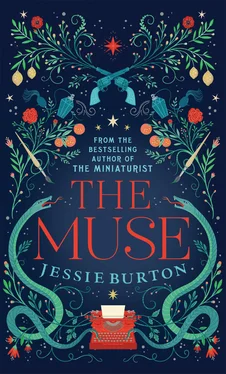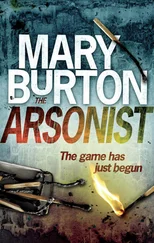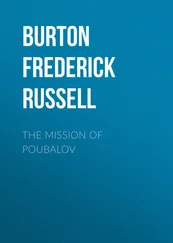‘A polar bear ?’
‘Yes. He tells me he interviewed a duke in his house,’ Isaac said, laying the wood blocks on her open hands. Olive saw how the tips of her fingers were stained red. She hadn’t stopped painting since meeting him. She was working on smaller canvases, filling notebooks with sketches; it was as if she had plugged herself in — to what, exactly, she wasn’t entirely sure — and although she was terrified that this long seam of inspiration was going to end, she felt that as long as Isaac was close, and she was ready for it, for him, her output might continue.
She knew that by staying down here, she had avoided a confrontation about her true self — no art-school confession with her father was required. And yet she was happier than she’d been in a long time.
‘He told me the duke had a polar bear in his drawing room,’ Isaac went on. ‘ Lo había cazado? ’
‘He’d hunted it down.’
‘Yes. With a gun.’
Olive curled her fingers up, hoping he might comment on their dyed appearance, so she could say, Oh, I paint a bit too. Would you like to see? He would come and see the painting and reply, This is extraordinary, you are extraordinary. How did I not see? And then they would kiss, him taking her face in his hands, bending down to brush his lips on hers, full of astonishment at how good she was. She so desperately wanted him to see how good she was.
But Isaac did not notice her fingers, and so Olive turned instead to the anomalous polar bear in her mind’s eye, a piece of the Arctic, a grotesquery in the Spanish heat, the barbarity and expense of it, the chill in the heart of the home. ‘Why did you tell me about that priest?’ she asked, trying to assert herself. ‘Were you trying to frighten me?’
‘No. I want you to see what’s happening here. So when you go home, you will tell other people.’
‘I’m not going home, Isaac.’
She waited for him to express his pleasure, but he did not. ‘Isaac, you do know I’m not like my parents, don’t you?’ she said.
‘What do you mean?’
‘They’re frightened of things. I’m not.’
Olive wanted to communicate that whatever Isaac thought they were, she was the opposite. She didn’t see things in black and white, like they did. She was nothing like them at all. It felt very important that he should know this.
‘There’s a gypsy camp, out in the hills,’ he said, as if he hadn’t heard her. ‘They lost one of their boys. Not lost ,’ he corrected himself. ‘They didn’t lose him. He was beaten by a gang of men. He was twelve. He died.’
‘How awful.’
Isaac put down the axe and walked towards a slope at the end of the orchard. ‘ Ven aquí ,’ he said. Come here . Together, they surveyed the land before them. A couple of far-off buzzards wheeled in the sky in search of prey along the ground. The skies were so large, the mountains beyond so solid; it seemed the only violence possible here was the violence of the natural world.
‘It’ll be all right,’ Olive whispered. She imagined slipping her hand into his, the two of them, standing here for ever.
His face was hard. ‘The people hold this soil in their blood. That is why the landlords fear them.’ He paused. ‘I worry for my sister.’
Olive was surprised by this. ‘Teresa? She’ll be fine.’
At the beginning, Teresa had come every other day to clean and cook. Now she was coming daily. The house still had its dark corners, and its sense of absent occupancy, but it had benefited from her quiet and watchful presence. She never said much, just going about her business through the rooms, taking the weekly envelope of pesetas from Harold with a nod.
‘Teresa is not married,’ said Isaac. ‘She is not rich. She is nothing that fits.’
‘What do you mean?’
‘She’s the daughter of a gypsy—’
‘A gypsy ? How romantic.’
He raised his eyebrow. ‘And the sister of a socialist. I do not know which is worse for her.’
‘Why?’
‘The police, the mayor, the caciques . My own father. They do not like me. I’ve been in fights. And she is too close—’
‘Isaac, don’t worry,’ Olive said, attempting a tone of mature assurance. ‘We’ll look after her.’
Isaac laughed. ‘Until you leave.’
‘I told you. I’m never going to leave.’
‘What do you want from this life, señorita?’
‘I–I don’t know exactly. I know I’d like to stay here.’
Isaac looked as if he was going to say something, and her whole body willed him to say how glad he was to hear this — but he was interrupted by the sound of crunching leaves. Teresa appeared at the bottom of the slope, her satchel strapped across her body, a flat expression in her eyes. ‘ La señora te necesita ,’ she said to Isaac.
‘Why?’ said Olive. ‘Why does my mother want him?’
Teresa and her brother stared at each other, until eventually Isaac capitulated, sighing as he moved back down the slope, not saying another word.
As Isaac moved through the trees, Teresa imagined for a moment that she and Olive were hunters together, watching their prey before deciding to let it go, preferring instead to stand side by side in the cold air. It was not the thrill of the kill they wanted, but simply the companionship that came from sharing a mutual target.
Isaac was fond of saying that Teresa was the kind of girl who’d sell her grandmother if she had to, not that she’d ever had a grandmother to sell. The worst thing was, Teresa sometimes did feel a sort of icy indifference to those around her, who’d never helped her, making it clear that she wasn’t worth the bother. She looked over at the furrows she and Olive had made with the gardening forks. The seeds were still deep in the soil, and would not show green shoots for months. Teresa was relieved that she had wanted to hand Olive those seeds. Olive somehow reminded her that she was still capable of feeling happiness.
‘Let’s go and smoke on the veranda,’ said Olive. ‘I stole three of my father’s cigarettes.’
Only Olive smoked. From above them inside the house came the sound of a slamming door. ‘Do sit,’ she said to Teresa, but only after Harold’s motor car had revved down to the rusting gates at the bottom of the slope did Teresa obey. ‘That’s Daddy out again,’ Olive said.
‘Will your mother see us? I must work.’
‘You don’t have to work every minute of the day, Tere. They won’t get rid of you for sitting down for five minutes. And besides.’ Olive lit the cigarette and took an inexpert drag. ‘She’s talking to your brother.’
Teresa had seen the empty pill bottles in Sarah’s room, the indecipherable stretch of words around the small brown vials. She’d heard Sarah sobbing once, trying to bury the sound in her pillow, and had seen a flash of silvery white scars running down in criss-cross lines at the top of her legs. Surmising from the stolen cigarettes that Olive was in a more reckless mood than the last time she’d brought this up, Teresa asked, ‘Is your mother very sick?’
‘She’s a depressive.’ Olive sat back in the rocking chair, blowing out a funnel of blue smoke.
‘A depressive ?’
‘Smiles in ballrooms, weeps in bedrooms. Ill, in her head.’ Olive tapped her temple. ‘And here.’ She touched her heart. ‘She gets worse, gets better. Gets worse again.’
‘That is hard,’ Teresa said, surprised by the other girl’s frankness.
Olive turned to look at her. ‘Do you mean that, or are you just saying it?’
‘No, señorita. I mean it.’ And Teresa did mean it; but really her wish was for Olive to confide in her about everything, and she would say what she had to, in order to make it so. Olive looked out at the orchard. To Teresa, she seemed more at ease in her skin. Her clothes, unusual and boyish, suited her; even her untameable crown of hair seemed intrinsically to fit. Being here in Arazuelo seemed to have brought her out of herself.
Читать дальше












